Jon Acuff's Blog, page 47
August 27, 2015
Announcing the 15-city fall Do Over tour!
Don’t call it a comeback! Actually, this might be the one time in my life where LL Cool J lyrics are not appropriate.
The spring Do Over tour went so well, we decided we not only wanted to comeback with a fall tour, but we wanted to make it even bigger.
Announcing the fall Do Over tour!
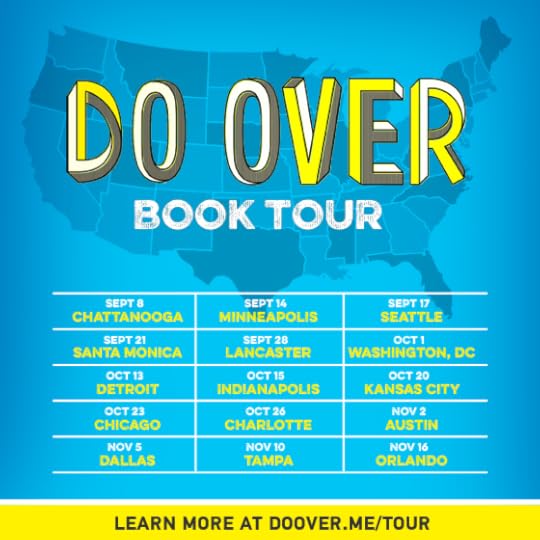
What if you could change the way you looked at your job and your career?
What if you could rescue Monday, reinvent your work, and never get stuck again?
Those are the questions I’ll be answering as I visit fifteen cities this fall to talk about my latest book, Do Over!
The last tour was awesome! In addition to signing books and hanging out with so many friends, I got to do a live illustration of the four career transitions everyone will experience.
A tour might feel a little old fashioned what with the webinars and the Lady Gagas and the hippity hop snapchat these kids are doing these days. But the more time I spend online, the more I realize offline matters more. That’s why I can’t wait to meet so many of you and hear about your Do Over stories.
The events are all free, but space is limited so you need to register to attend.
The fall Do Over Tour is coming to 15 cities. Find out if yours is on the list!
Click To Tweet
Register today to reserve your seat:
September 8 – Chattanooga, TN | Books-A-Million Register Here
September 14 – Minneapolis, MN | Half Price Books Register Here
September 17 – Seattle, WA | Half Price Books Register Here
September 21 – Santa Monica, CA | Barnes & Noble Register Here
September 28 – Lancaster, PA | Barnes & Noble Register Here
October 1 – Washington, D.C. | TBD Register Here
October 13 – Detroit, MI | TBD Register Here
October 15 – Indianapolis, IN | Barnes & Noble Register Here
October 20 – Kansas City, MO | Half Price Books Register Here
October 23 – Chicago, IL | The Book Cellar Register Here
October 26 – Charlotte, NC | Barnes & Noble Register Here
November 2 – Austin, TX | Barnes & Noble Register Here
November 5 – Dallas, TX | Barnes & Noble Register Here
November 10 – Tampa, FL | TBD Register Here
November 16 – Orlando, FL | Barnes & Noble Register Here
These events are going to be so much fun, hope to see you there!
p.s. If you haven’t ordered Do Over yet, pick up a copy today!
The post Announcing the 15-city fall Do Over tour! appeared first on Jon Acuff.
August 24, 2015
Divorce is so ordinary we sometimes forget the extraordinary pain it causes.
Yesterday on my flight, a 13-year-old boy who was traveling alone sat next to me. Before we took off he lowered the tray table in front of him, put his head in his arms and started sobbing. Big tears covered the tray as he wept in his seat.
I asked him, “Are you alright buddy?” He told me he had spent 3 months with his mother for the summer and was flying back to another state to live with his dad.
Sometimes the frequency of divorce makes us forget the heartache of it. It’s such an ordinary thing these days that we tend to rush right by the extraordinary pain it causes.
If you grew up with divorced parents, are going through a divorce or are divorced, I’m sorry for all the times that I didn’t understand how hard that experience can be. It might be common, but it’s never easy.
I wrote those four paragraphs on my Facebook page a few days ago.
Four hours after I did, the mother of that little boy messaged me. A friend who follows me sent her the post. After confirming the details of the flight and his name to make sure it was actually her son, she thanked me.
It had been a hard day for both of them. The division of family, whether for the school year after a summer with mom, or the weekend after a few days with dad, is never easy. I started to cry in the airport while I read her message and had to pretend the tears were falling because I was eating a really transcendent airport food court burrito. You know the kind, no rip down the middle, great structural integrity, bite after bite? Burritos, is there anything they can’t do?
But then a strange thing happened, people started commenting on the post. They started sharing their stories. About dads who did their best and moms who carried homes through storms and hurt that hasn’t disappeared but has healed. The Internet reminded me for the thousandth time that we’re not in this alone as people started to share their stories. (You can read the comments on Facebook right here.)
If you see someone on an airplane crying, ask if he’s OK. If he’s not, talk to him about his favorite football team so he’ll forget he’s sad for a minute. You might think you’re flying to Dallas because you’re supposed to talk to 10,000 people at an event, but there might be just be one person who needs a few words of encouragement even more.
The post Divorce is so ordinary we sometimes forget the extraordinary pain it causes. appeared first on Jon Acuff.
August 20, 2015
How to apologize to 27,000 people.
Last year I had a Viking funeral for my email list.
I don’t know if it was technically a Viking funeral because our pyre was a portable fire pit and we put in our driveway, not a river. I also lit it with a bic lighter instead of an arrow that had been set aflame.
I would have done the arrow thing, don’t doubt that for a second, but our HOA would have killed me if I started shooting flaming projectiles at makeshift funeral pyres in our neighborhood pool. (It’s right there in our home owner tenets next to what kind of siding you can have on your house.)
I lit my email list on fire because it had become a sore spot in the Acuff house.
For a year, every time I met with someone smart, they would ask me, “How’s your email list going? It’s all about the email list! You’ve got to get your email list together or you’ll probably have to dance for nickels in the street soon.”
Then I would freak out, tell Jenny I didn’t know how to do an email list but that it was the most important thing in the world and then freak out some more.
Worst of all, I didn’t do anything with my email list for a year. I was so confused by what to do that I decided to do nothing. (That’s kind of like when you’re so busy you decide that the best decision would be to take a nap.)
The email list went cold.
Finally after watching me wring my hands for a year, Jenny told me to let it go. (If you’re the parent of a daughter, you just repeated the phrase “let it go, let it go,” in your head.)
We got the list, crumpled it up, said some kind words and lit it on fire in the driveway.
If that’s a point of advice in any Internet Marketer’s approach to growing your audience please let me know because it sounds like what crazy people do. I’d love to tell you that after that moment things worked well, but that would be a lie.
I started sending out my blog posts via email, but I still had a confusing number of different lists in my system. Faced with more complications, I set it up best I could and then moved into a four part system I call: Laziness, Entitlement, Embarrassment, Empathy or LEEE! for short.
Step 1: Laziness
In this phase, you tell yourself, “I don’t want to do something.” And then you don’t do something. (In this case, I was too lazy to figure out how to use an email list correctly.)
Step 2: Entitlement
In this phase, you tell yourself, “I shouldn’t have to do something.” I write about entitlement a lot because I struggle with it. Case in point. Who exactly was I expecting to handle all my email issues? Why did I think I shouldn’t have to do it? So entitled.
Laziness says, “I don’t want to.” Entitlement says, “I shouldn’t have to.” Both are toxic.
Click To Tweet
Step 3: Embarrassment
In this phase, you tell yourself, “I should already know how to do this.” It’s embarrassing to feel like you’re the only one on the planet who doesn’t know how to properly give people your blog posts via email. That’s so 2008 of me.
Step 4: Empathy
In this phase, you finally admit you messed up, apologize and ask for empathy.
That brings us to this exact moment.
I recently found out I had been sending out duplicate emails to 7,000 people. I hate getting emails myself and double emails is twice as terrible. I apologize if that’s been happening to you.
I also have known for a year that 20,000 people signed up to get emails from me and then I didn’t send them any. I was just lazy/confused and didn’t fix the issue. Nothing builds long term trust like telling people, “Sign up for my email list and I’ll send you my blog posts. Just kidding!”
I apologize.
Today, everyone who has ever said, “I’d like to see some ideas from Jon Acuff,” got this blog post sent to them.
If I haven’t sent you anything for a year and you forgot who I was, save for one vague memory of a writer who is really, really, really ridiculously good looking, I understand if you want to unsubscribe. Please, please don’t mark this as spam though.
When you do that, it makes the email provider think I’m some sort of global pirate company selling gold schemes from a relative you didn’t know you had and they suspend my whole account. I’m not a global pirate, I promise.
I’m just a writer who is terrible at email, standing in front of you trying to remember a line from the movie Notting Hill.
I didn’t have a fire in the driveway this time, but I am learning how to do things better.
And apparently that sometimes means being terrible at them first.
Sorry.
The post How to apologize to 27,000 people. appeared first on Jon Acuff.
August 11, 2015
Join me for the Ask An Author Anything Webinar on August 18th!
“What’s one piece of advice you would give to someone who wants to write a book?” is one of the hardest questions I routinely get asked. (You’d think that “Where’s the best place for queso?” would be, but the answer to that question is easy. “In my belly.”)
Don’t get me wrong, I love handing out sage pearls of wisdom more than banks love handing out lollipops, but one piece of advice for something as complicated and nuanced as writing a book…that’s tough.
What kind of book do you want to write? Fiction or non-fiction? When are you writing it? Why are you writing it? Do you want to go with traditional publishing, self publishing, or scrimshaw? Do you have an audience already or is your goal to build one with the book? (Needless to say, there’s a lot of factors.)
That’s why I’m excited to join Author Launch for a FREE webinar on writing a book next Tuesday, August 18th!
 We’ll take an in-depth look at the writing and publishing process behind Do Over, and I’ll answer some of your questions about writing a book.
We’ll take an in-depth look at the writing and publishing process behind Do Over, and I’ll answer some of your questions about writing a book.
It’s a part of their Ask An Author Anything series, and it’s free, but you have to register to be a part.
Want to have your question about writing a book featured in the webinar? Ask it here in the comments and we’ll pick a few of them to use!
This is going to be a lot of fun, so I hope you can join me on Tuesday night, August 18th at 7pm Central (8pm Eastern)! The replay will be available to everyone who registers, as well.
AWESOME BONUS NEWS EXPRESSED IN ALL CAPS: Author Launch is going to be giving away 50 signed copies of Do Over to folks who register for the webinar! How awesome is that!
Sign up here and I’ll see you next Tuesday night! –> Ask An Author Anything with Jon Acuff
The post Join me for the Ask An Author Anything Webinar on August 18th! appeared first on Jon Acuff.
August 4, 2015
One simple way to figure out which criticism to listen to.
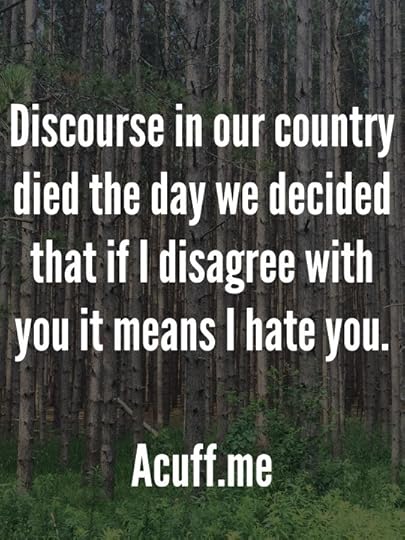
Criticism sticks.
Compliments slide right off our backs like water off a puffin. (Ducks have had their day.)
It’s a sticky substance, like great wads of gum that will bond you to the street if you’re not careful, preventing you from moving forward.
It would be easy to say, “Screw the haters!” or “Ignore all criticism!”
That’s the type of rhetoric that helps you build an Instagram account with motivational photos, but it’s not great advice.
Not everyone who disagrees with you is a hater. Sometimes they are just someone with a different opinion. Discourse in our country died the day we decided that if I disagree with you it means I hate you.
Discourse in our country died the day we decided that if I disagree with you it means I hate you.
Click To Tweet
And not all criticism is toxic. Some of it is actually good for you. Some feedback is extremely healthy. How do you tell the difference between the poisons and the vitamins?
One way is to ask what it cost someone to give you that feedback.
The problem right now is that most criticism doesn’t cost the critic anything. I can leave a 1 star review anonymously on Amazon. There’s no proof I read the book. There’s a “Verified Purchase” label that proves someone bought it, but there’s no way to know if I even opened the book. It only took 42 seconds for me to leave a couple of bile filled sentences and then move on with the rest of my day. This is a fairly new phenomenon by the way.
A friend once asked me, “Do you want to know what Kurt Vonnegut told me?” First of all, I would start most of my sentences that way and second, how do you not respond yes, to that? I of course wanted to hear what the famed author had to say.
My friend, continued, “Kurt told me that if Mark Twain could have had nameless, faceless people writing reviews of his work on Amazon he would have jumped off a building.”
In Twain’s day, it cost something to criticize on a grand scale. You had to be a reporter or a book reviewer. You had to have a platform and platforms were difficult to come by. You might criticize Huckleberry Finn in the comfort of your own home, but you had no way to say something nasty right at the most important point of purchase on the planet, Amazon.
When I wrote advertising for the Home Depot, the point of purchase was one of the most important locations of the entire store. Right by the register is a magical space where people are making final purchase decisions. Twain could have never imagined a world where a stranger could stand by the register and say, “This book sucks!” every time someone tried to buy Tom Sawyer. That’s what a 1 star review next to the buy button on Amazon is doing.
The truth is that criticism that cost the critic nothing, is worth nothing.
Criticism that cost the critic nothing, is worth nothing.
Click To Tweet
That doesn’t mean 1 star reviews are useless. There are some 1 star reviews of my book Start that I agree with. You can tell from their feedback that they have read the entire book and prepared some thoughtful comments. They’re a verified purchaser, sharing their name. The feedback cost them time, the most limited resource of all, and their identity.
The angry tweet from a stranger? That’s 140 characters. That costs nothing and is worth nothing.
The facebook comment full of hate? That took 10 seconds. That costs nothing and is worth nothing.
The backstabbing gossip from a coworker in a breakroom? That costs nothing and is worth nothing.
If the feedback costs the critic something, it might be worth something. They might be giving you a gift, instead of just cutting you down.
If it costs them nothing though, its value is the same.
Move on quickly.
Don’t get stuck worrying about nothing.
P.S. If you liked this blog post, you’ll love my new book Do Over . It’s at minimum, 1 bajillion times better than this post.
. It’s at minimum, 1 bajillion times better than this post.
The post One simple way to figure out which criticism to listen to. appeared first on Jon Acuff.
July 28, 2015
The 3 ways I write.
When I write, I start by creating an “honest draft.”
That means I suspend that part of myself that is desperately thinking, “Will people like this? Will people like me? Will they be mad or happy with this sentence?” I struggle with wanting everyone on the planet to like me and that affliction can lead to weak, watered down writing. (Trying to make everyone like you is also the quickest way to hate yourself.)
Trying to make everyone like you is the quickest way to hate yourself.
Click To Tweet
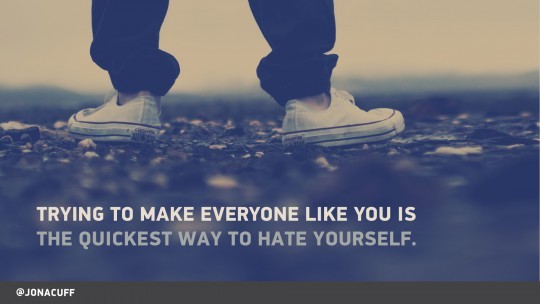
Being honest, also means I have to watch out for unnecessary mic drop moments. As a writer it’s tempting to say things that are dramatic but not necessarily true. You’re not lying when you do this, you’re just performing for an audience that isn’t even there yet. That changes what you write in a negative way.
An example of that was a line I was going to put in my new book Do Over until my wife told me it was a lie. The line was, “People never forget your generosity and always remember your greed.” That one would have received a billion retweets because it has that tricky “say two things but in opposite way” hustle and flow to it.
until my wife told me it was a lie. The line was, “People never forget your generosity and always remember your greed.” That one would have received a billion retweets because it has that tricky “say two things but in opposite way” hustle and flow to it.
The problem is that it’s only half true. People forget your generosity all the time. That’s the concept of taking things for granted. The second half is true though. When you’re greedy to someone, when you burn a relationship, people remember that for a long time. I took the part about generosity out and focused on the true statement about greed.
Once I have written a draft that is honest, I read it and immediately get depressed.
The words that flow out of me naturally are in the vein of Counting Crows.
I’m a pretty melancholy person at heart and what erupts at first is usually pretty grey.
But I’m hopeful, too. I have a bedrock of joy and I have to dig through the first draft to find it. I must crawl through the murky for the light at the end of the tunnel as it were.
So the second draft is the “hope draft.”
It is not sugar coated. It’s honestly hopeful, not falsely optimistic. You can say hard things and still be hopeful. I can go too far in this draft with the positivity if I am not careful. I can end up promising things that are fake, adding too many roses to a garden that does have tigers in it.
Once I’m satisfied that I’ve been honest and hopeful, I start on the “hilarious draft.”
I like to laugh. I like making other people laugh. It also differentiates me from a lot of the people in my space because they’re not funny. Humor is a strength of mine and like all strengths, I tend to ignore it if I am not careful.
When writing, I often slip into “serious author mode.” This usually involves a tweed coat with elbow patches and a pipe that harkens to a day when people still carried caramels in their pockets.
After I read the first two drafts, I usually realize they are completely devoid of humor. Movie studios hire comedians to “punch up” scripts by adding jokes to them and that is essentially what I do.
The challenge is to not get lazy with this third draft.
If I try to take shortcuts I end up adding tired jokes to my prose that have very little tread left on them. If I throw in a random mention of queso for instance, that is usually me being lazy.
Honest.
Hopeful.
Hilarious.
That’s my writing process.
What’s yours?
The post The 3 ways I write. appeared first on Jon Acuff.
July 24, 2015
The kind of story that stops you in your tracks
In one of my first visits to Thistle Farms, a non-profit organization in Nashville, a woman in the program told our group a story.
When she was 12, her mom trafficked her to her drug dealer. She traded her for drugs and for the next two decades she was prostituted across the country.
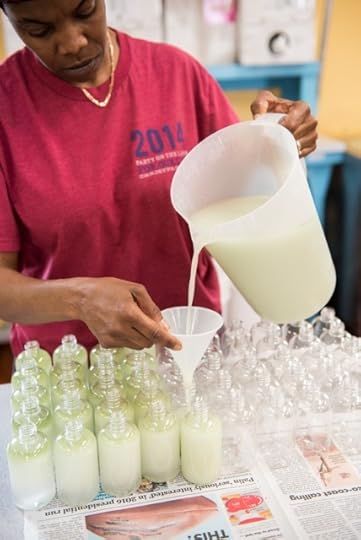 I have an 11-year-old daughter. Hearing stories like that is overwhelming.
I have an 11-year-old daughter. Hearing stories like that is overwhelming.
How do you not respond when you bump into something like that?
The problem is that the issues seem so complex and impossible to solve. We’re talking about homelessness, drug addiction and prostitution. Where do you even start? Can one person even make a difference?
But then you meet Becca Stevens, the founder of Thistle Farms. Then you see a Thistle Farms product at Whole Foods that the women in the program have made with a label that says “Love Heals.” Then you hear the 12-year-old girl who is now in her 30s tell a different story. A story of hope. A story of handmade candles. A story of healing. And you realize it’s not impossible. For 18 years this organization has been giving women new stories, new jobs and new homes.
Hope like that is contagious and the first time I went to Thistle Farms, I knew we were going to do something awesome together someday.
Well, now it’s time.
On Friday, August 14th, I’m holding an event at Thistle Farms in Nashville called, “Brighter!”
I’ll be sharing about how we all get Do Over moments in life. (You may have noticed a tweet or 1,000 about how keen I am on the idea of starting over.) I’ll be talking about the time I lost my creative voice and what it took to get it back. And I’ll be challenging you to use your voice, too. I’ll also be giving you a sneak peek at a project I’ll be launching this fall.
 There will be music, food and a lot of fun. Best of all, all the proceeds will go to Thistle Farms.
There will be music, food and a lot of fun. Best of all, all the proceeds will go to Thistle Farms.
Space at the beautiful Thistle Stop Café is limited, so don’t wait to buy tickets.
On Saturday, August 15, from 8AM – 12PM Jenny and I will also be making candles with the Thistle Farms team. Our goal is to finish 2,000 candles. I’m pretty sure I can do 500 an hour by myself, but I’m terrible at estimating things. It would probably be better if you were there too. If you’d like to join us there are a few volunteer spots open. Email Stacye to RSVP!
If you’ve ever been to one of my events before you know how fun they are. If you haven’t, this is the perfect one to check one out. Grab your ticket right here!
Sometimes, the world feels dark, but it doesn’t have to be. It’s not impossible to make it brighter. All it takes is a candle and a little bit of hope.
The post The kind of story that stops you in your tracks appeared first on Jon Acuff.
July 21, 2015
Our calendars call us on the lies we all tell.
“I’d rather binge watch Netflix than see a book I wrote on a shelf in a store.”
“I’d rather follow the plots of seven different television shows than cut the grand opening ribbon at a store I own.”
“I’d rather play Candy Crush than get in shape.”
“I’d rather stare at my phone until I get lost in a digital haze than build a relationship with the people I’m actually in the same room with.”
No one ever says horrible things like this.
No one ever makes such proclamations.
At least not with our mouths.
Most of us declare things like that with hands though.
Most of us proclaim things like that with our calendars.
Most of us shout things like that with our phones.
Most of us would cringe if we were honest for 30 seconds about the things we donate our time to.
That’s the scary thing. None of the things I mentioned above take our time. We give it to them.
Which is actually not such a scary thing at all when you think about it, because it means at any moment, you can stop giving them your time. You have that power. You don’t need permission from anyone. You get to make that decision.
I binge watched an entire season of Blacklist last fall in about 6 days. I can’t just watch one episode of a television show on Netflix, it’s like trying to eat one potato chip. Finally, I got tired of donating time to things that ultimately don’t matter.
That’s why I created the DO Summer checklist. I knew that when I was traveling and tempted to relax with some mindless hours of TV, that simple piece of paper would haunt me. I knew that sitting on an airplane, instead of playing Plants vs. Zombies, my go to app, I would think about that checklist. And I’d write. I’d read. I’d do the things I promised to do, because I wanted to finish 1,500 minutes of focused time this summer.
You don’t have to DO Summer with me. You might have a different tool that works for you, but if you don’t, download it today.
Be honest about where you’re donating your time. Don’t let your mouth shout a promise your calendar isn’t keeping. Do your work. You’re the one giving the gift of time to someone or something. Make sure it’s the best recipient.
Don’t let your mouth shout a promise your calendar isn’t keeping. Do your work.
Click To Tweet
The post Our calendars call us on the lies we all tell. appeared first on Jon Acuff.
July 7, 2015
Exciting news about the release of the Do Over audio book!
“When is the audio book for Do Over coming out?”
I’ve had a handful of people ask me that question at live events this spring and summer, and it always sounds a little anti-climactic when I respond because the answer isn’t, “this Tuesday!” or “in two weeks, but I can hardly wait because I had so much fun recording it!”
The answer is, “It’s already out! It came out when the book did, on April 7th.”
See, wasn’t that a little underwhelming?
But wait, how about if I let you hear what the first few minutes of the book sounds like for the first time ever? That’s exciting news, right?
Here you go, the first four minutes of Chapter One, in which I tell you about what a terrible mailman I was:
http://acuff.me/wp-content/uploads/2015/07/DoOverAudioSample.mp3
(If you’re reading this blog post in an email, you might have to click here to listen to the audio on my site.)
The clip sounds a little tinny because we had to MacGyver it to put it on this blog, but I assure you the real thing is silky smooth like Jodeci. (Keeping relevant with my modern pop culture references!)
Why should you listen to the audiobook?
1.I read it myself and it’s a lot of fun!
2. I added bonus material that’s not in the printed book.
3. It’s perfect for a long commute, work out or summer road trip.
So yeah, the exciting news is that the Do Over audio book is available today! The catch is, it has been for three months.
You can get your copy on Amazon as an Audible download or in CD format.
The post Exciting news about the release of the Do Over audio book! appeared first on Jon Acuff.
June 30, 2015
How to look good on the Internet.
Last Wednesday, my wife and I took our daughters to the new American Girl Doll store in Nashville.
My kids had gift cards from a friend and were eager to snatch a doll from the cold hands of the grave. That sentence took a dark turn but American Girl Doll will “archive” dolls, taking them off the market for years if not forever. My kids have decided this marketing method is akin to killing the doll. Occasionally they will say chilling sentences like this to me: “They killed Samantha but now they brought her back, so she’s like zombie Samantha.”
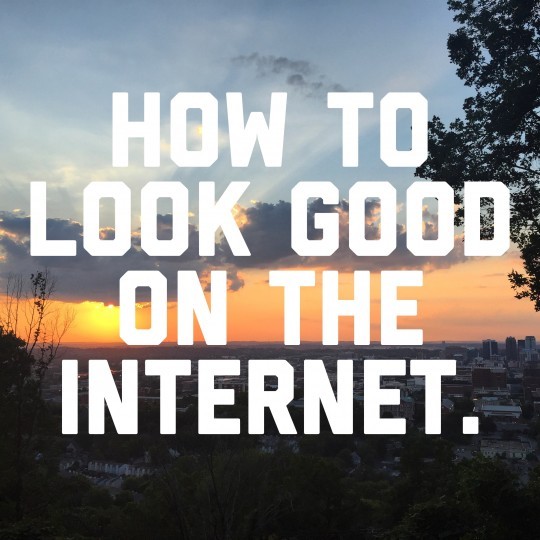
While we were in the store, I took a photo of my daughters and was going to post it on Instagram. I was planning to caption it with this:
“How do you balance business travel and home life? You take your kids to the American Girl Doll store at 10:45AM on a Wednesday.”
That’s a true idea. I’ve learned in the last two years that part of the key to travel is that when you’re home you need to really be home. I need to take time during the week to be present with my family. Morning daddy/daughter dates, early afternoon adventures and summer Fridays when I stop working early help offset the days I travel. It helps with parenting and it helps with marriage, too.
Right before I posted the photo, I asked myself in the middle of the mall, “Why am I really doing this?”
I wasn’t posting the photo to help other business travelers with an idea that worked for me.
I wasn’t posting the photo to share a fun family moment.
I wasn’t posting the photo so that years later I could dig back through digital archives and remember that time at the store.
I was posting that photo because I wanted strangers to think I was a good dad.
I was posting that photo because I was worried that strangers thought I traveled all the time and was a bad dad.
I might not have vocalized it, but what was really going on in my head was this:
“I bet some people think I’m never home. I post photos of my travels, but not a lot of my home life so it probably feels out of balance. If I share this photo of the American Girl Doll store, maybe people will think I’m a good dad.”
That thought in itself is ridiculous, but here’s where it gets super stupid.
I was ignoring my kids to write a caption for a photo I was sharing in order to convince people I was a good dad.
In summary, I was being a bad dad in real life in order to look like a good dad on social media.
Hitting pause before I hit publish gave me a second to realize a few things.
1. No one online has ever said I’m a bad dad.
2. Even if strangers online said I was a bad dad, who cares? They don’t really know me.
3. Sometimes I miss moments in my attempt to document them.
That third one is a bit of an epidemic right now and the reason is that a significant shift happened in social media a few years ago.
We used to use social media to document moments we experienced. Now we use it to create moments so that we can document them.
We once used social media to document moments we had. Now we create moments just to document them.
Click To Tweet
We stage our lives because the whole world is a stage.
Instead of being present to a moment with my kids, I tried to use the moment to create a message about who I was as a dad.
Don’t do that.
It’s dumb.
Post lots of photos. Share lots of updates. Have a ton of fun on social media. I love it and will continue to use it in healthy ways. I am going to wear out the Acuff family hashtag, #WickedAwesomeAcuffSummer but only when my motives are honest.
Hit pause before you publish.
Don’t perform for strangers you’ll never meet. Be present to the people you’re actually with.
Don’t perform for strangers you’ll never meet. Be present to the people you’re actually with.
Click To Tweet
The post How to look good on the Internet. appeared first on Jon Acuff.



